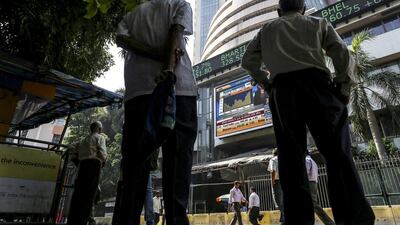With the results of India’s five-week-long general election scheduled to be announced on Friday, corporate India and investors are among those most eagerly and nervously awaiting the outcome, set to shape the future economy of the world’s largest democracy.
Expectations are mounting that the Hindu nationalist Bharatiya Janata Party (BJP), leading the National Democratic Alliance coalition, will topple Congress. Narendra Modi, the BJP’s candidate for prime minister and a former tea vendor, is perceived as particularly business-friendly because of strong economic growth in the state of Gujarat, where he has been the chief minister since 2001.
Whatever government emerges, it will have its work cut out as it comes to power after a period of slowing growth and high inflation in the country. Congress, mired in a number of corruption scandals, has been blamed for a slowdown in infrastructure projects and accused of dithering over reforms.
Business leaders have high hopes that the next government can revive the Indian growth story.
“We need to get the groove back in the economy immediately,” says Shashi Kiran Shetty, the executive chairman of Mumbai-based Allcargo Logistics, which is listed on the Mumbai and Indian National stock exchanges.
“Irrespective of the party that wins the elections, the priority for the new government will be India’s economy. To restore the confidence in our economic growth, immediate measures will have to be taken,” Mr Shetty said.
India’s economic growth slowed to a decade low of 4.9 per cent in the financial year that ended in March. The consensus is that the country needs to achieve growth levels of about 8 per cent to create enough jobs for its citizens.
“Confidence in our markets, sectors and consumers has to be corrected through control on inflation and decongestion of the policy paralysis,” says Mr Shetty. “This single focus will not only restore our earnings as an economy, but it will also create a wave of employment for citizens and bring a new lease on life in the country.”
Anup Kumar Sinha is a professor of economics at the Indian Institute of Management in Kolkata. He agrees that the next government will need to take swift action to revive the economy.
“The new government in New Delhi will have to prioritise two important issues,” Mr Sinha says. “The first relates to the restoration of business confidence. The second priority of the new government would be to manage the fiscal problems of large deficits, unproductive subsidies and the need to switch expenditures towards more socially productive areas such as education and health.”
Others note that the government should first tackle the basic issues holding back the economy in order for India to get a longer look from foreign investors.
“They would look at broad indicators which would jump-start consumption in India; they would look at indicators that would improve exports; and they would look at indicators of improving the investment climate in India,” says Ankur Bisen, the senior vice president of retail at Technopak, a consultancy firm.
He says that investors are waiting for signs of reforms in the power sector and improvement to roads and infrastructure, which in turn have an effect across the economy.
“These elections are important to how the entire consumption story of India will pan out,” Mr Bisen says.
Everyone agrees that a stable government is needed rather than a highly fragmented coalition, which would hamper decision making.
“This election is a critical one and the outcome would decide the fate of our shaky economy in the next many years and how we are viewed by the critical foreign investors,” says Raghvendra Nath, the managing director of Ladderup Wealth Management.
He explains that a BJP win would be likely to be positive for Middle East trade with India and for foreign direct investment from the region.
“If you basically look at the previous NDA regime, from 1999 to 2004, the BJP and NDA government at that time had quite proven their credentials in terms of supporting foreign investment into India, as well as economic reforms,” Mr Nath says.
He points out that Mr Modi has been very vocal about supporting industry and exports, as well as the importance of foreign investment to India’s economic development, adding that Mr Modi and the wider party are “pretty progressive” in their economic stance. “I don’t think they would try do anything to reshape the environment by doing anything that will go against that thought process,” adds Mr Nath.
Indian expatriates in the UAE are among those whose confidence would be boosted if a proactive government comes into power.
“It’s all about stability,” says Sudhesh Giriyan, the vice president and business head of the remittances company Xpress Money. “As long as they’re able to bring in that confidence among the NRI [non-resident Indian] segment, it will really go a long way. Those who are holding back because of a lack of confidence in the Indian economy will definitely start putting more money into India – be it the Indian property segment or stocks.”
Gyan Daultani, the vice president of human resources at Nihilent Technologies, a Pune-based IT company, hopes that the next government will signal a turning point for India.
“If the India story has to make global headlines again,” says Mr Daultani, “the new government should focus on inclusive governance, transparent and corruption-free interactions, industrial development and more jobs for both skilled and unskilled labour. The new government will have to urgently invest in infrastructure upgrades for roads, highways, bridges, airports, seaports. At the same time, focus should also be on improving law and order, eliminating internal security threats and improving women’s rights and safety. While all of this may sound generic, the time to install these systems can’t be more critical.”
business@thenational.ae
Follow us on Twitter @Ind_Insights

